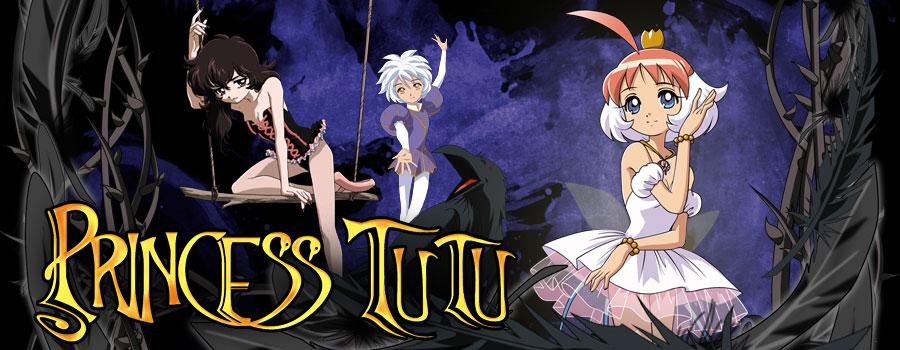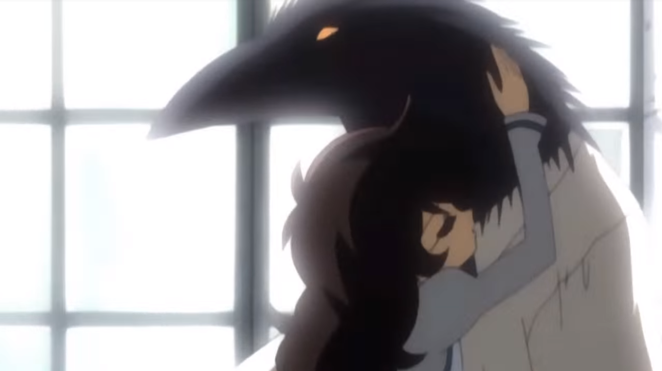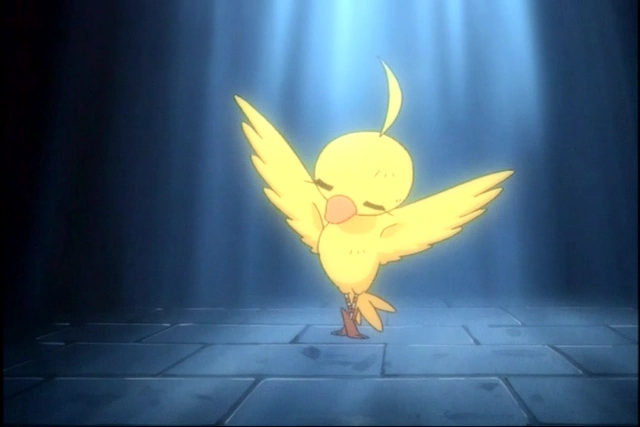 |
| From https://cdn.animenewsnetwork.com/thumbnails/crop900x350/ video/category/410/key_art_princess_tutu.jpg |
Director: Junichi Sato (Chief Director), Shogo Koumoto (Series Director)
Screenplay: Chiaki J. Konaka, Mamiko
Ikeda, Michiko Yokote, Rika Nakase, Takuya Satō
Voice Actors: Nanae Katou as Duck/Princess
Tutu, Nana Mizuki as Rue, Naoki Yanagi as Mythos, Takahiro Sakurai as Fakir, Akiko
Hiramatsu as Edel, Erino Hazuki as Uzura, Kyōko Kishida as The Narrator, Noboru
Mitani as Drosselmeyer, Sachi Matsumoto as Pike
Viewed in Japanese with English Subtitles
Synopsis: In a fairytale town, a storywriter named Drosselmeyer,
even after death, strives forward to complete the tale of the Prince and the
Crow in real life. The original story, so far, had the evil crow defeated by at
the cost of the Prince sacrificing his heart, shattering it into pieces and as
a result losing his emotions. Becoming the emotionless Mythos, he is warded
around the ballet school by Fakir, a very protective confidant, and Rue, the
girl who loves him. There is also Duck, a literal duck Drosselmeyer turned into
a girl with a magical necklace, one which also allows her to become Princess
Tutu, a magical figure with the sole intention of recapture all of Mythos'
heart shards for him.
The best way to describe Princess Tutu? Magical. An obvious
comment but in awareness that head writer of the two season series Michiko Yokote first came up with her
premise of a fairy tale, a tribute to ballet with a girl who was once a duck,
long before the series finally came to be in 2002. Encompassing ballet and
fairytales, it explicitly references countless examples of both in plot and
music, even referencing material outside of them like A Midnight Summer's Dream. Even Drosselmeyer, the mysterious old
man beyond death living in a clockwork filled netherworld, is named after a
character in the Nutcracker. As a
result, its innately a commentary on itself, of these characters and this material
because of all these reference, as much as it is a sweet fantasy series of the age and gender
of the viewer. Thankfully, ultimately why Princess
Tutu is an underrated gem from the 2000s which deserves wider recognition, what
could've gone up its own navel with trite meta commentary is more interesting
than that. Instead it's a proper fairytale heard many times before, only the
crux being a tale of when these characters realise their positions in the story
and overcoming the archetypes they were initially written as.
 |
| From http://4.bp.blogspot.com/-KligJQXnjVs/VLL7vuq8THI/ AAAAAAAACDY/KBBisBJ-Ots/s1600/tAG_1097.jpg |
Bright, elegant and using very recognisable classical pieces - segments from Swan Lake appear in most of the episodes especially as Duck becomes a white swan in the opening credit sequence for every episode - it's also effectively a magical girl show. A subgenre which began with Mitsuteru Yokoyama's Sally the Witch, where (stereotypically) a young girl gains the abilities to transform into a magical figure, most well known even outside anime fandom through the Sailor Moon franchise. This never becomes a critique of magical girls - darker examples of that include Puella Magi Madoka Magica (2011) - instead merely a catalyst for the plot. Where, instead, a knight finds himself questioning his position to weld a sword, the villains are not doing a great job and have an existential crisis, and Duck, a squawky klutz in human form, an angelic dancer as Princess Tutu, finds herself conflicted by Mythos regaining his heart shards, the task fraught with him suffering from newly acquired emotions and the other players in Drosselmeyer's story interacting with her.
Whilst it does have the look of a
2000s production, including notable compute effects, its helped considerably by
the colourful, openly fantastical world which evokes European culture right
down to German translations of the episode titles. Openly fantastical too, as
members of the cast are also animals. Humanoid hippo students with birds
dressed and talking like schoolgirls. And Mr. Cat, one of the funniest side
characters whose portrayal by Yasunori
Matsumoto is above the god-awful attempt in the English dub completely, the
ballet teacher and anthropomorphised cat who threatens every female student
with marriage. It never becomes weird in an abstract way, honestly, but that
doesn't matter. Instead everything feels appropriate for what a fairytale is,
where the unpredictable happens but in a way logical to its own world.
| From https://ibdp.videovore.com/video/50081810?size=600x400 |
Where it gets more unconventional is as much through the split between its two seasons. The first is very straight forward and could be a great series in its own right with a conclusion. After is where things become much more interesting. Noticeable, the other half was originally split into fifteen minute episodes before they were recreated for the West by ADV Films as regular twenty minute plus episodes. They're where the characters really begin to question and undercut the storytelling tropes being pushed upon them. That the writer is a character in the story, Drosselmeyer a Greek chorus in himself and already established as a bastard in the first season, desiring a tragedy with his cast, immediately raises the stakes. When characters don't follow his plans, due to being emotional complex people, the plan he has falls off the rails. The mix of drama, comedy and occasional moments of grim consequences is sustained throughout both halves but the later half gets more esoteric. When one character briefly turns into a tree, this is definitely the closest the series as a whole gets to be strange.
Especially when they hired Chiaki J. Konaka, one of my favourite
screenwriters known for his unconventional storytelling, where it gets at its
strangest, with puppets dancing and wormholes into the clockwork netherworld,
my beloved screenwriter's touch to be found. If anything Princess Tutu proved that, whilst a distinct voice in the
director's seat is still important, writers for individual episodes are as much
guides for the show's personality as I learnt with this series. In general the
project, whilst having to explain a lot more than usually for a show like this
due to being a series for an audience of all ages, does a lot of heavy lifting
perfectly, particularly as it does have
"situation of the week" style stories for single episodes, having to
tie up a narrative with characters only appearing in that one story and make
their contributions justifiable. In fact what I presumed, early into the second
season, would dangerously become tiring actually gets to the point of the
exasperation the villains eventually have with themselves as well as their
task. Somehow a narcissitic lothario who feels he cannot love as many women as
he'd want and has his man servant gore him with bulls continually, another of
the funniest characters of the series despite being in one episode only, manages
to have a vital point to him in the story of Rue, the secondary female
character who's isolation away from Mythos due to Princess Tutu plays to the
tragedy of her own life. This broad, conventional storytelling technique of a
short story per episode is actually used in clever ways as a result, little
moments having a lot of use from even its most comedic characters - one of the
best little moments, from a Konaka scripted
episode, has a joke of Mr. Cat trying to ward away a goat woman who likes him help
two characters in their series long concerns by overhearing him at the right
moment, examples like this bound to grow in rewarding upon rewatching Princess Tutu multiple times.
 |
| From https://nerdloveshop.files.wordpress.com/2017/11/tutu11.png?w=663 |
I also learnt more so with Princess Tutu an even greater appreciation of Japanese voice actors. Snippets of the late ADV Film's English dub causes me to wonder how my younger self could stand them, a over- sugared recreation of stereotypical anime voices that feeling hollow from what I heard. Everyone in the Japanese dub however feels natural in their roles. Nanae Katou as Duck in particular is perfect, right down to a mallard's squawk to her voice. In a series like this, which is playful and still has humour even into its last episodes when the story gets serious, where it is a family friendly fairytale, there's a lot to admire in hearing characters who are taken serious, even the comedic ones having moments of seriousness to admire them. (And anyway, even that humour's to be loved, characters like Duck's best friend Pike (Sachi Matsumoto) and Lilie (Yuri Shiratori) so easy to make awful if they are played too broadly, more so when Lilie's running gag is that she is so enthusiastic about Duck constantly failing to a fetishishtic degree.)
So whilst not abstract, right from
its beginning to an ending that is both bitter sweet but also joyful, Princess Tutu triumphs by being very
unconventional. Where it goes to in the second half leads to so many curveballs
that, as an anime series should, it feels like you've ended up in an entirely
different series from the first episodes and it was built up to fully. And especially
as a story that is both a fairytale children could watch, but also is a tribute
to fairytales and ballet for adults to learn from, it means a lot. In the
former, it's a great story. In the later, Princess
Tutu also succeeded for me by introducing this particular viewer to
references I hadn't known of. Each episode starts with a female narrator using
an existing story, from those you'd recognise to obscurer choices like Hans
Christian Andersen's The Red Shoes being twisted into unconventional direction
mid-narration. As someone with no knowledge of ballet, its grown my interest
considerably. If anything the success, even if as a cult series, of Princess Tutu must've be a wonderful
experience for head writer Michiko Yokote
and the entire production staff.
 |
| From https://vignette.wikia.nocookie.net/princesstutu/images/3/ 38/Duck.png/revision/latest?cb=20120624205833 |
No comments:
Post a Comment